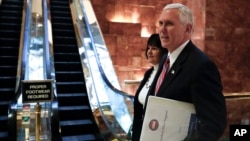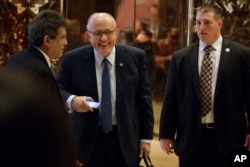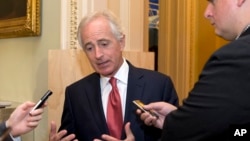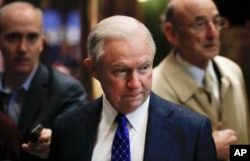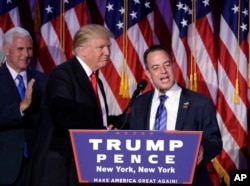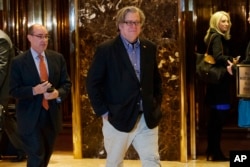U.S. President-elect Donald Trump and Vice President-elect Mike Pence met Tuesday in New York to discuss key appointments in their new government.
The two have more than 4,000 jobs to fill in the U.S. government as they prepare to assume power January 20, but their immediate focus is on filling the top diplomatic post and that of defense secretary, attorney general and Homeland Security chief. All are positions that present the government's face to the world and help lead the country's fight against terrorism.
No public announcements emerged from the daylong meeting at Trump's Manhattan skyscraper home.
But in Washington on Tuesday night, the White House said it had received a signed memorandum of understanding from Pence, an initial step in being able to provide more detailed briefing materials to the incoming administration. Brandi Hoffine, a White House spokeswoman, said "The next step is for the President-elect's transition team to provide us with the names of the individuals they have authorized to represent their transition effort across the government."
There was no indication when that would happen.
Secretary of State
Trump aides are signaling that former New York Mayor Rudy Giuliani could be named secretary of state. The 72-year-old Giuliani has no previous foreign policy experience, but Trump associates say he has emerged as a narrow favorite for the position. He was a loyal supporter of Trump during his lengthy run for the presidency leading to his stunning upset win a week ago, often appearing on television news shows to promote the Trump candidacy.
The blunt-spoken Giuliani gained national prominence during his tenure as New York mayor more than a decade ago. For many Americans, he became a symbol of U.S. resolve in the fight against Islamic terrorism in the aftermath of the 2001 terrorist attacks on New York and Washington that killed nearly 3,000 people.
But Trump aides also say the president-elect is considering other names, including that of John Bolton, a hawkish former diplomat who was the country's United Nations ambassador under President George W. Bush. Bolton has been a regular television critic of the foreign policies of President Barack Obama.
In Washington, the chairman of the U.S. Senate Committee on Foreign Relations, Bob Corker of Tennessee, told VOA Tuesday that either way, Trump will make an impact on the global stage. He said the Trump presidency "could lead to us resolving our differences with China and other places more readily." He also said he expects other NATO countries will do more to pull their full weight in the alliance.
Crocker also was hopeful about the future of the nuclear deal with Iran.
"That's an area where there will be a lot of bipartisanship … pushing back against missile testing, the buying of conventional weapons they are not supposed to be purchasing," Corker said. "What the next secretary of state will realize is, look, what we want to do is build consensus with our partners, and Iran if we continue to push back as we should be doing, which we are not now doing, Iran will create, just because of their nature, the opportunity for a renegotiation."
National Security adviser, Defense Secretary
U.S. media reports say that another Trump supporter during the election contest, retired Army General Michael Flynn, once the head of the U.S. Defense Intelligence Agency, is a possible pick as national security adviser. Alabama Senator Jeff Sessions, an early Trump campaign adviser, could be named secretary of defense or attorney general, the country's top legal position.
But selection of Trump's key national security officials was complicated Tuesday when a key figure abruptly resigned from his transition team without explanation. Mike Rogers, a former chairman of the House of Representatives Intelligence Committee, had been advising top Trump officials on possible appointments.
One conflict Trump is facing is between his vow during the campaign to "drain the swamp" in official Washington and now his need to find qualified officials with experience to handle the government's most challenging positions.
Chief of Staff , Chief Strategist
So far, Trump has made just two appointments. He picked Reince Priebus, the chairman of the Republican National Committee, as his White House chief of staff, a selection applauded by Republican leaders who control both houses of Congress.
Trump's choice of Stephen Bannon as his chief strategist has drawn widespread criticism from Democrats and some groups outside the government. Bannon was the Trump campaign's chief executive, joining his election effort in its last months after leading Breitbart News, a website he once described as "the platform of the alt-right," which occasionally has been the home to white nationalist and anti-Semitic vitriol and anti-women views.
Trump is set to become the country's 45th president and the first ever to never have been elected previously to public office, or served in its military or been appointed to a high-level government position.
Popular vote vs Electoral College
He also will be the fifth White House occupant who lost the popular vote in the presidential election but won through the country's Electoral College system of picking its leaders.
In essence, U.S. presidential elections are a series of state-by-state contests, with the winner in each collecting all the electoral votes. The biggest states hold the most sway in the Electoral College, where Trump, when all the votes are counted, is likely to finish with a 306-232 edge over his Democratic opponent, former U.S. Secretary of State Hillary Clinton.
But Trump, because he won narrowly in numerous states, while Clinton had a large vote count advantage in two of the biggest states, California and New York, trails her in the popular vote count by more than 670,000 votes.
Trump, in the past, has attacked the two-century-old Electoral College system as a "disaster for a democracy" and said in a television interview after the election, "I would rather see it where you went with simple votes."
In tweets on his Twitter account Tuesday, Trump said, "The Electoral College is actually genius in that it brings all states, including the smaller ones, into play. If the election were based on total popular vote I would have campaigned in N.Y., Florida and California and won even bigger and more easily."
Clinton and Trump both contested the large southeastern state of Florida, which Trump won, but neither campaigned much in New York or California, where Clinton's dominance ahead of the election was a foregone conclusion.
WATCH: Brief explainer on what the Electoral College is and does




